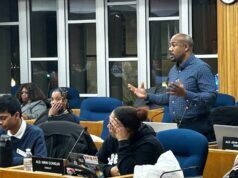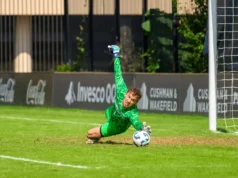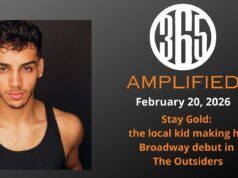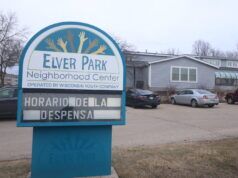It’s hard to believe that a quarter-century has passed since Dr. Rev. Alex Gee first started a small but ambitious organization to support and empower at-risk and disenfranchised African Americans on Madison’s south side.
“I have to be completely honest … I’m still processing what 25 years means,” says Gee, the pastor of Fountain of Life Covenant Church and president of the Nehemiah Center for Urban Leadership Development. Both are located in the heart of the south side of Madison on Badger Rd., just off Park Street. “For 25 years, we’ve worked to strengthen Madison. We always have known that Madison wants to be a great, inclusive community. We talk about it a lot, but I think as a community we’re still finding out what it means to become that. So, Nehemiah’s focus on the African-American community for the last 25 years has been to really benefit the overall community.”
Nehemiah Center for Urban Leadership Development, a non-profit, community-based youth and family service organization providing a host of programs and family development services, recently hosted a 25th Anniversary Party titled “Celebrating Our Past, Creating Our Future” on Nov. 3 at Overture Center. For 25 years, Nehemiah has met the needs of Dane County’s African-American families by addressing their unique spiritual, academic, social, physical and economic concerns. They focus on strengthening the African-American family through personal and community transformation and through character and leadership development … and now, more than ever, through economic empowerment.
on Nov. 3 at the Overture Center.
(Photo by Kynala Phillips, Madison365)
“The fact that the community has invited us in for 25 years to partner with it, to represent it, to advocate for and with it … it’s amazing,” Gee says. “Not many people get to live out their dream and their call in the same community and I’ve been able to do that. I’m not sure if what I’m done would have worked anyplace else. I’m very grateful to Madison.”
Gee and I sit in his office on Badger Road like we did many times while I was Editor-in-Chief of The Madison Times, which now seems long ago. Gee is very comfortable in the same building that he’s been in for a quarter-century. Although the view has changed a bit. Back in the day, we used to look down over a self-serve car wash on 711 W. Badger Rd. behind Gee’s Nehemiah office building. Then it was an abandoned car wash. Now it’s a beautiful field with a whole lot of potential.
“Oh, man, that old car wash,” Gee laughs. “That car wash was there for 30 years!” Gee still has his ledge outside of his office that he goes out on to clear his head and look out over the Beltline and Park Street and what is the gateway to South Madison.
“St. Mary’s [Hospital], the bus station, Villager Mall … I’ve just watched this corner change, man. I’ve seen the south side change quite a bit,” Gee says. “The vision was always about bringing the best of this community into the broader community and helping people reach their potential. Personally, I had that in my family and in my community and in my church, but for those who didn’t have the support system that I had, I wanted to replicate that support in Nehemiah … so others would know what it’s like to have people believing in you and loving you unconditionally.”
An exciting new Madison College South campus will soon be built right down the street, too. While the landscape and architecture has changed along Park St., the broader city has still been slow to listen and respond to the needs of people of color in this community, Gee says.
“This is one of the most diverse zip codes in the entire state, but I think the city is still slow on the uptake in recognizing the strength and the cultural beauty of this community,” Gee says.
“The fact that the community has invited us in for 25 years to partner with it, to represent it, to advocate for and with it … it’s amazing. Not many people get to live out their dream and their call in the same community and I’ve been able to do that. I’m not sure if what I’m done would have worked anyplace else. I’m very grateful to Madison.”
Gee is a Madison southsider through and through. He’s seen the good, the bad, and the ugly of that area from a lifetime of activism in the area. Through it all, he always kept an eye on strengthening the people of the area and supporting individuals, families, and communities. Nehemiah specializes in interrupting the cycles of poverty, racism, and discrimination that many families face by empowering individuals with dignity and by also challenging unjust systems.
“We’ve done that by working with and supporting some of Madison’s most-marginalized populations,” he says. “We so often talk about services … but we rarely name love, unconditional love – along with affirmation and high expectations – people who dare to see in you what you don’t see in yourself. That’s always been my story and I want that to be a story for everybody that Nehemiah touches.”
Building capacity in individiuals
With that in mind, Nehemiah gives loans to people who have never gotten loans, finds jobs to people who have never had jobs, and provides opportunities to people who have never had opportunity before.
“Folks who have been convicted of murder have had keys to our church,” Gee says. “We really believe that the best in our community have not been exposed, recognized, or celebrated. And that’s been a part of our work. That’s been our gift to the overall Madison community … that we build as much capacity within African-American individuals and families as we can.”
Back in the early 90s, Gee left his job at the University of Wisconsin to start Nehemiah, which got an initial boost from a Madison Community Foundation grant and some small donations from Madison-area churches.
“I feel like my mentors teed me up for long-term leadership. I was 28 when I started Nehemiah. I left my job at the university. This is my office. It was all open here,” Gee explains. “I had to sand my desk because we had all of this hand-me-down stuff.”
That first year was all about studying the community and trying to figure out what it needed and how to respond in the proper way. Gee was young and inexperienced. It was the elders that would help guide him.
“I appreciate the fact that in those early days my mentors steered me towards Leadership Greater Madison and becoming part of The Madison Club and Downtown Rotary because they saw those places as some of the center and hubs for power brokers,” Gee remembers. “People who mentored me as a 28-year-old tried to put me in places where I’d have ongoing relationships that would help me grow. They didn’t try to pigeonhole me as a ‘south side’ leader, a ‘black’ leader, or a ‘young’ leader. I felt like they really worked to resource me as an emerging leader and I think that’s an approach that we need to take today.”
Gee admits that he doesn’t know if in today’s climate the older leaders have the relationships with younger leaders to do that.
“But I’m a beneficiary myself of that kind of partnership. Bob Koch was the chairman and CEO of American Family Insurance. Jane Coleman was the executive director of the Madison Community Foundation. Norma Madsen was a board member of AmFam and of the [Madison] Community Foundation. Gary Schaeffer was the president of a bank,” Gee remembers. “Those folks – along with Milele [Chikasa Anana] – really encouraged me and taught me to look forward to the future. So I’m grateful to the people who really helped me understand what it means to be a leader for the long haul and to try and give me those networks.”
Changing America and the birth of Nehemiah
Lots of things were going on in the early ’90s – both locally and nationally – that helped set the stage for the creation of Nehemiah.
“Around that time, the Somerset fire happened, Rodney King incident happened. I saw America really changing 25 years ago,” Gee remembers. “What I really felt was that I grew up here in Madison and had good experiences and I really want to help young African-American kids navigate the systems because I think Madison will respond. I think the resources are accessible if someone could just help my community navigate it.”
So Nehemiah Community Development Corporation was born.
“The whole idea was that we are going to help bridge people that are disenfranchised into what we thought was a very resourced and very welcoming community. Twenty-five years later, we realize that there has been some hostility that perpetuates those bridges,” Gee says. “We wanted to help black people coming to this city – for whatever reason – make that smooth transition. We hoped that if you were new here, we could help you acclimate. We focused on four areas that to this day we still build upon – youth leadership, family empowerment, housing and economic development.
“For 25 years, those four things we kept focusing on as we realized that African Americans could find their place in this community,” he adds.
Gee remembers when South Madison used to feel so detached from the rest of the community. “When I was in high school, people used to talk about Mr. P’s and Pearlies [Place] on the south side they made it seem like it was south-central LA or something,” Gee laughs. “I feel like South Madison is now more connected into the life of Madison. I feel like it has become a vibrant part of Madison and that south Madison is more in the overall discussion of the community.
“The black community had basically doubled from 1980 to 1990 and back then the whole idea was how do we meet and serve the needs of the black community?” Gee continues. “How do we keep people out of trouble? How do we respond to Work to Welfare when [Tommy] Thompson was governor? Somewhere – maybe 10 years into our agency – we realized that we’re not just the traditional social service providers.”
Nehemiah became one of those places where the clients became the staff. People who originally came in seeking help were now the leaders. “They helped us recruit, they helped us talk to boys, recovering addicts, people coming out of prison,” Gee says. “Folks who we thought were only clients became part of the team of people who helped us in building up the African-American community.
“We realized that we are really a community development and a leadership development entity and not just a black social service entity,” he adds. “That evolution really happened 10 years ago when we realized that our focus was really going to be threads of leadership in every program we offer. We are going to let every child, every single mom, every housing participant … know that they are part of the solution to making Madison better.”
It has to be that way for it to work. “Some of the clients still have ankle bracelets on but they are still some of the most prolific emerging leaders that we have because of their ability to speak to the next generation,” Gee says. “State what they’ve done wrong, but then speak to power and truth and love. It’s incredible the way that they can speak to such a broad spectrum of folks. It’s powerful.
“And there are so many more potential leaders out there. We want to find them,” he adds. “We can’t afford to throw great people away.”
Justified Anger
Life changed for Gee in November of 2013 when his Justified Anger essay in The Capital Times that stated, among other things, how upset he was at how the people in Madison skate by on so many of its racial issues. The powerful essay voiced concerns about ongoing racism and disparities here in Madison and about the poor experiences disenfranchised African-American residents have regularly. .
Justified Anger was created and is led by African-American leaders whose mission is to “eliminate racial disparities and create opportunities that empower the African-American community to achieve its full potential and prosper.”
“What Justified Anger has done … it has helped us to proliferate our message,” Gee says. “Really for that first year, we were trying to figure out: is this a fad? Is this just an article? A gathering? A town hall meeting? As it became apparent to us that a movement was happening, there was still pressure to create programming,” Gee says. “Well, Nehemiah’s been doing programming since ’92. Boys and Girls Club, Urban League [of Greater Madison], One City [Early Learning Centers], Centro [Hispano] .. we’ve got programming. But who holds the systematic practitioners’ feet to the fire? Who talks to the [UW] chancellor and the elected officials and the employers not only about what they are doing wrong, but giving them strategies for what they can do to be better players within this community and how they need to be listening to the African-American community. That was a big piece of Justified Anger was able to do.”
Nehemiah has been able to focus on all of these different areas and programs, Gee says, because “the community has been telling us what we need for so many years.”
“Nehemiah has been able to focus on building the African-American community from a programmatic approach,” he says. “Justified Anger allows us to build strategic partnerships and to train our white allies, give them exposure to the issues and then to mobilize them in their own communities to bring about change.”
So, it’s not just mentoring a kid; it’s about becoming a spokesperson in your own community about the importance of diversity.
“We’ve taken 400 white Madisonians through the U.S. History class. The next one starts in February and we already have people trying to register,” Gee says of “Black History for a New Day.” “And that history class is not the end but a means to an end. So now that you understand how we got here, what’s your part in moving us ahead? If we’re able to get general Madison to realize it’s part in bringing about change, that’s very powerful.
“It’s very easy to ask black Madison how to fix Madison when we have not broken Madison, but to take individuals who are beneficiaries of a strong community that caters to its intellectual white community to begin to empower folks … it’s incredible,” he adds.
Focus on economic empowerment
It’s great to teach white folks about important stuff that they should know about U.S. race relations. And programs are great, too. But you can have all of the white liberal wokeness and all of the innovative programs in the world and it won’t begin to solve anything when you’re dealing with a racial wealth gap where the average wealth for white families is seven times higher than average wealth for black families and where median white wealth is 12 times higher than median black wealth.
“That’s right. One of the things with Justified Anger is we’ve listened to the community who is saying, ‘We need to generate black wealth,” Gee says. “We’ve created a loan fund for black entrepreneurs – $100,000 that we’ve raised. We’ve loaned as much as $20,000 at a time. We discuss that wealth gap in the history class – how it came to be and how people and the government were complicit in it.
“My mother was a cotton-picker; she was a sharecropper. So [sister] Lilada [Gee] and I are the first black people in our lineage since our arrival to this land who have not picked cotton in this land. The very first,” Gee continues. “So, for whites to say or think ‘we’re all on the same playing field’ when the residual effects of slavery and Jim Crow are laid clearly at our feet … that doesn’t jibe.
“We have to really focus on how we can create wealth in the black community and that is starting businesses, owning businesses, owning houses, buying property, developing. Part of our focus is moving in that direction and in the next few months we will really be talking about that at Nehemiah,” Gee adds. “We have some really exciting economic ventures that we are engaged in that will both strengthen the community, model what this looks like, and hopefully grow more entrepreneurs in this community. It’s exciting. Closing that [racial wealth] gap is imperative, or this is all a lost cause.
The economic gap, Gee says, is eating away at us. “And that has an impact on the educational gap. People aren’t saying that, though,” Gee says. “They say, ‘Let’s fix education, it will help the economics.’ I say, ‘Let’s help the economics because it helps education.’ Let’s go both ways. Let’s not just invest in a kid now and wait 25-30 years. Let’s invest in the black entrepreneurs now and watch its positive impact on crime, drop-out rates, etc. That’s what I want to see happen and that’s going to be a big part of what Nehemiah is going to be focusing on in the future.”
Building a Better Madison
Thanks to that essay in The Captial Times four years ago and the movement that followed, a lot of white people know Alex Gee now that didn’t know him before. A lot of powerful Madison white people. Gee has worked with them through partnerships and collaborations to help move the mission of Nehemiah forward. Sometimes that strategy is met with outspoken criticism from young, grassroots black leaders in Madison.
“Whatever works, works. We have to make sure with black folks that one size fits all … because we don’t do that with our white colleagues,” Gee says. “If they are strengthening folks, let them strengthen folks. Sometimes that changes over time and sometimes it doesn’t. Sometimes that proves the way to go. I just think that because of the era that I was raised up in and because of the networks and mentors that I had, I feel like I know how to help bring about change.
“We say with our Justified Anger work that systematic change happens at a policy, programmatic, and personal level. So I think between the efforts of both of our movements, we are getting things done. I’m comfortable working with legislators. I’m comfortable working with CEOs and confronting them on how they hire and put people on boards,” he adds. “I’m comfortable, using our Nehemiah history classes, helping to change people’s personal perspectives. It’s a three-prong approach. If you’re touching any one of those, it’s effecting change. We’re just trying to focus on all three because that’s important.”
Gee says that there is a grassroots campaign that is intrinsic to Nehemiah’s work. “When you’re grassroots, typically, you’re not programmatic and when you are programmatic you’re not typically grassroots. We’re working to do both,” he says. “To have that come from the African-American community is a beautiful thing. It’s the piece that’s been missing that will help us really make and see some strides in healing the racial divide.”
Gee adds that we all have to play in our own lanes. “I’m comfortable in the boardrooms. Others are comfortable in grassroots scenarios. But we have to all be working towards the same goals – that is strengthening the African-American community in order to make Madison better,” Gee says. “The black community is a subset of Madison and if it’s not strong – and the Race to Equity and other reports have indicated that it is not strong – then Madison cannot continue to boast about its accolades and its position in the United States.
“Our efforts are about making Madison stronger, but our unique approach is about strengthening the black folks and the black community because Madison cannot be stronger without us being at the table,” Gee adds.
Greater Madison needs to realize that racial disparities, inequities, segregation affects all of us. Doing nothing or not doing enough is not an option.
“Who chooses to come to Madison; who opts to leave Madison? The net result is going to show up in a few years and this is not going to be the city it used to be. If we keep ignoring it, that will spell big trouble,” Gee says. “Milwaukee used to be one of the best places to live in America if you’re black. How does it get to be where it is? You couldn’t have paid Milwaukee to believe that it would be Milwaukee today.
“Madison is smart enough and small enough and wealthy enough to make the changes it needs to make. We have so much activism here,” he adds. “So, act! We have the resources and the conscious leadership. If we don’t take advantage of it now, it could get ugly in the future.
“When our knowledge catches up with our desire to be an all-inclusive community … when our hunger for making that happens catches up with our reputation, we are going to see some powerful transformation in Madison that I think will be part of a national trend,” Gee continues. “There’s no quick fix. The beauty of what Justified Anger does is that it allows us to not only strengthen the African-American community, but to strengthen and challenge and help the broader community.”
Gee says he feels honored to be doing what he loves for 25 years in the community he has always called home.
“I feel like it’s been great work and that I have a fantastic staff. I have people who are committed and who could make a lot more money someplace else. I really feel like there has been a guiding spirit. I feel like this is our calling. The people who come to work here have a mission to make the community better,” Gee says. “When I look at the impact on the city that we’ve had for these 25 years, I’m really proud. People stayed because we have a vision and if we can continue to have a vision, we can continue to attract black people and make jobs for these people.”
Nehemiah has grown in resources and in popularity since it first started 25 years ago, but in many aspects, it’s still very grassroots at its heart.
“We’ve never gotten a federal grant in 25 years. We get no state dollars. Most of the money is raised in the local community. We don’t have a national charter like Urban League, NAACP, Boys and Girls Club – who are all doing great work – but we just come from an idea of African-American south siders,” Gee says. “To sit in the basement and have this idea and to share this idea with the broader community. To plan for a year and to launch it in 1992. To still be here 25 years later through changing economies and administrations. We found a way to be relevant and supportive of this local community.
“We’ve been able to do this in the community for 25 years because the community believed in us,” he adds. “I’m most proud of the fact that we’ve been invited in and we’ve been supported without having to sell our community up the river. We said, ‘This is what the community says it wants. And we’re not going to argue with people about that.’ My job has been to listen to the black community and what it needs.”








